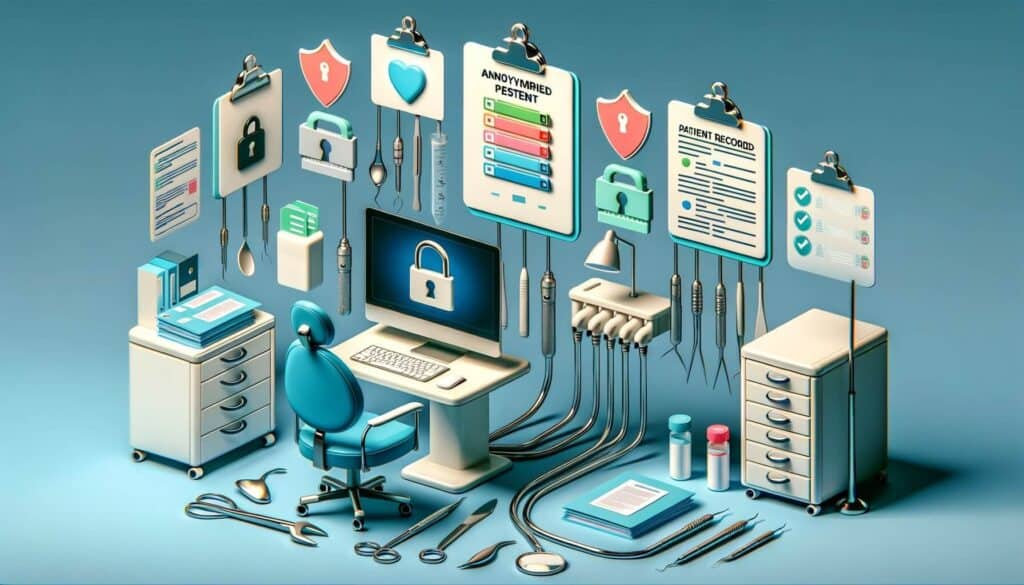
By Carol Peters March 10, 2025
In today’s digital age, data security is of utmost importance, especially in industries that handle sensitive information such as healthcare. Dental clinics, like any other healthcare provider, must ensure the protection of patient data, including payment card information. This is where PCI compliance comes into play.
PCI compliance refers to adhering to the Payment Card Industry Data Security Standard (PCI DSS), a set of security standards designed to protect cardholder data. In this article, we will explore the importance of PCI compliance in dental clinics and discuss key requirements, best practices, and common challenges associated with achieving and maintaining PCI compliance.
Understanding the Importance of PCI Compliance
The importance of PCI compliance in dental clinics cannot be overstated. Dental clinics handle a significant amount of sensitive patient information, including credit card details used for payment. Failure to comply with PCI DSS can result in severe consequences, including financial penalties, reputational damage, and loss of patient trust.
According to the 2020 Cost of a Data Breach Report by IBM, the average cost of a data breach in the healthcare industry was $7.13 million. This staggering figure highlights the need for dental clinics to prioritize PCI compliance to protect their patients and their business.
Key Requirements for Achieving PCI Compliance in Dental Clinics

To achieve PCI compliance, dental clinics must meet a set of key requirements outlined in the PCI DSS. These requirements include maintaining a secure network, protecting cardholder data, implementing strong access control measures, regularly monitoring and testing networks, and maintaining an information security policy. Let’s delve into each requirement in detail.
1. Maintaining a Secure Network: Dental clinics must ensure the use of secure network infrastructure, including firewalls, to protect cardholder data from unauthorized access. Firewalls act as a barrier between internal networks and the internet, preventing malicious actors from infiltrating the system.
2. Protecting Cardholder Data: Dental clinics must implement strong encryption measures to protect cardholder data during transmission and storage. Encryption ensures that even if data is intercepted, it remains unreadable and unusable to unauthorized individuals.
3. Implementing Strong Access Control Measures: Dental clinics must restrict access to cardholder data by implementing strong access control measures. This includes assigning unique IDs to individuals with computer access, implementing two-factor authentication, and regularly reviewing access privileges.
4. Regularly Monitoring and Testing Networks: Dental clinics must continuously monitor and test their networks for vulnerabilities and potential security breaches. This includes conducting regular security assessments, penetration testing, and vulnerability scanning to identify and address any weaknesses in the system.
5. Maintaining an Information Security Policy: Dental clinics must have a comprehensive information security policy in place that outlines the organization’s commitment to data security. This policy should cover areas such as data classification, incident response procedures, and employee responsibilities regarding data protection.
Implementing Secure Payment Processing Systems in Dental Clinics

One of the crucial aspects of achieving PCI compliance in dental clinics is implementing secure payment processing systems. Dental clinics often process payments through various channels, including in-person transactions, online payments, and recurring billing. To ensure the security of these transactions, dental clinics should consider the following best practices:
1. Use PCI-compliant payment processors: Dental clinics should partner with payment processors that are PCI compliant. These processors have undergone rigorous security assessments and adhere to the highest standards of data protection.
2. Implement point-to-point encryption (P2PE): P2PE encrypts cardholder data at the point of interaction, such as a card reader, and ensures that it remains encrypted throughout the entire transaction process. This significantly reduces the risk of data breaches.
3. Tokenization: Tokenization replaces sensitive cardholder data with a unique identifier called a token. This token is used for transaction processing, while the actual cardholder data is securely stored in a separate, PCI-compliant environment. Tokenization minimizes the risk of storing sensitive data within the dental clinic’s systems.
4. Secure online payment portals: If dental clinics offer online payment options, they should ensure that their payment portals are secure. This includes using SSL/TLS encryption, regularly updating software, and implementing strong authentication measures.
Best Practices for Protecting Patient Data in Dental Clinics

In addition to implementing secure payment processing systems, dental clinics should adopt best practices to protect patient data. These practices include:
1. Employee training: Dental clinic staff should receive comprehensive training on data security, including PCI compliance. They should be educated on the importance of protecting patient data, how to identify and report potential security incidents, and best practices for handling sensitive information.
2. Access control: Dental clinics should implement strict access control measures to ensure that only authorized personnel have access to patient data. This includes using unique user IDs, strong passwords, and regularly reviewing access privileges.
3. Regular data backups: Dental clinics should regularly back up patient data to secure off-site locations. This ensures that in the event of a data breach or system failure, patient information can be restored without loss.
4. Secure physical storage: Physical records containing patient data should be stored securely, with restricted access and proper safeguards in place. This includes locked cabinets, surveillance systems, and visitor logs.
Training Staff on PCI Compliance and Data Security

Training staff on PCI compliance and data security is crucial for maintaining a secure environment in dental clinics. Here are some key aspects to consider when training staff:
1. General awareness training: All staff members should receive general awareness training on the importance of PCI compliance and data security. This training should cover topics such as the risks associated with data breaches, the role of PCI DSS, and best practices for protecting patient data.
2. Role-specific training: Different staff members may have different responsibilities when it comes to handling patient data. It is essential to provide role-specific training to ensure that each employee understands their responsibilities and follows the necessary protocols.
3. Ongoing training and updates: Data security threats and best practices evolve over time. It is crucial to provide ongoing training and updates to staff members to keep them informed about the latest security measures and potential risks.
4. Testing and certification: Consider implementing testing and certification programs to assess staff members’ understanding of PCI compliance and data security. This can help identify any knowledge gaps and ensure that staff members are adequately trained.
Conducting Regular Security Assessments and Audits
Regular security assessments and audits are essential for maintaining PCI compliance in dental clinics. These assessments help identify vulnerabilities, assess the effectiveness of security controls, and ensure ongoing compliance. Here are some key steps to consider when conducting security assessments and audits:
1. Internal assessments: Dental clinics should conduct internal assessments to identify potential security weaknesses within their systems. This can include vulnerability scanning, penetration testing, and reviewing access controls.
2. External assessments: External assessments involve engaging third-party security experts to conduct comprehensive audits of the dental clinic’s systems. These experts can provide an unbiased assessment of the clinic’s security posture and identify any vulnerabilities that may have been overlooked.
3. Remediation and action plans: Once vulnerabilities are identified, dental clinics should develop remediation plans to address these issues. These plans should outline specific actions to be taken, responsible parties, and timelines for completion.
4. Ongoing monitoring: Security assessments and audits should not be one-time events. Dental clinics should establish a process for ongoing monitoring and regular reassessment to ensure that security controls remain effective and compliant with PCI DSS.
Addressing Common Challenges in Achieving PCI Compliance
Achieving and maintaining PCI compliance in dental clinics can be challenging due to various factors. Some common challenges include:
1. Limited resources: Dental clinics, especially smaller practices, may have limited resources to invest in robust security measures and dedicated IT staff. However, it is crucial to prioritize data security and allocate resources accordingly.
2. Complexity of compliance requirements: The PCI DSS can be complex and challenging to understand, especially for non-technical staff. Dental clinics should seek guidance from experts or engage with a qualified security assessor to ensure a clear understanding of the requirements.
3. Third-party compliance: Dental clinics often rely on third-party vendors for various services, such as payment processing or electronic health records. It is essential to ensure that these vendors are also PCI compliant and have appropriate security measures in place.
4. Evolving threats: Cybersecurity threats are constantly evolving, and dental clinics must stay updated on the latest risks and security measures. Regular training, assessments, and engagement with security experts can help address these challenges.
Frequently Asked Questions about PCI Compliance in Dental Clinics
Q1. What is PCI compliance, and why is it important for dental clinics?
A1. PCI compliance refers to adhering to the Payment Card Industry Data Security Standard (PCI DSS) to protect cardholder data. It is important for dental clinics as it ensures the security of patient payment information, reduces the risk of data breaches, and helps maintain patient trust.
Q2. What are the key requirements for achieving PCI compliance in dental clinics?
A2. The key requirements for achieving PCI compliance in dental clinics include maintaining a secure network, protecting cardholder data, implementing strong access control measures, regularly monitoring and testing networks, and maintaining an information security policy.
Q3. How can dental clinics implement secure payment processing systems?
A3. Dental clinics can implement secure payment processing systems by partnering with PCI-compliant payment processors, implementing point-to-point encryption (P2PE), tokenization, and ensuring secure online payment portals.
Q4. How can dental clinics protect patient data?
A4. Dental clinics can protect patient data by providing employee training on data security, implementing strict access control measures, regularly backing up data, and ensuring secure physical storage of records.
Q5. How should dental clinics train staff on PCI compliance and data security?
A5. Dental clinics should provide general awareness training on PCI compliance and data security, offer role-specific training, provide ongoing training and updates, and consider implementing testing and certification programs.
Conclusion
PCI compliance is crucial for dental clinics to protect patient data and maintain the trust of their patients. By understanding the importance of PCI compliance, implementing secure payment processing systems, adopting best practices for data protection, training staff, conducting regular security assessments, and addressing common challenges, dental clinics can ensure the security of cardholder data and mitigate the risk of data breaches.
By prioritizing PCI compliance, dental clinics can safeguard their patients’ sensitive information and maintain a strong reputation in the healthcare industry.
